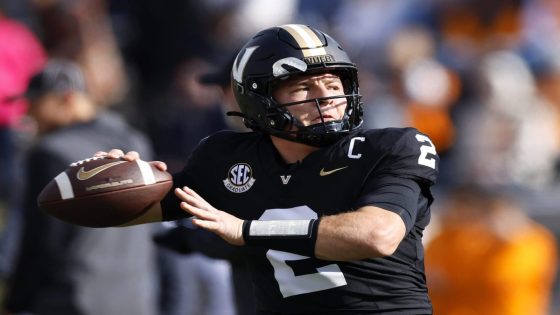A federal judge in Tennessee has granted Vanderbilt quarterback Diego Pavia a preliminary injunction allowing him to play one more season in 2025 after Pavia challenged an NCAA eligibility rule regarding junior college seasons.
Last month, Pavia filed an antitrust suit against the NCAA, arguing that its longstanding rule that counts junior college seasons toward an athlete’s four years of eligibility constituted an unlawful restraint on his ability to earn NIL compensation. Pavia used his first season in 2021 at New Mexico Military Institute before transferring to FBS schools New Mexico State and Vanderbilt.
Pavia initially sought a temporary restraining order in hopes of having his eligibility restored prior to the transfer portal opening on Dec. 9. Judge William Campbell Jr. denied that request granted Pavia an injunction Wednesday. Pavia, who’s expected to start for the Commodores in the Dec. 27 Birmingham Bowl, could remain with Vanderbilt next season, or he could enter the portal and pursue NIL offers at other schools.
His lawyer, Ryan Downton, told Rivals.com “I expect he’ll play at Vanderbilt in 2025.”
After the ruling, the NCAA expressed its disappointment.
“The NCAA is disappointed in today’s ruling and wants all student-athletes to maximize their name, image and likeness potential without depriving future student-athletes of opportunities,” the statement read. “Altering the enforcement of rules overwhelmingly supported by NCAA member schools makes a shifting environment even more unsettled.“The NCAA is making changes to deliver more benefits to student-athletes, but a patchwork of state laws and court opinions make clear that partnering with Congress is essential to provide stability for the future of all college athletes.”
My Lawyers are legit‼️
Ryan and Sal I appreciate yall!
God is good, All the time❤️— Diego Pavia (@diegopavia02) December 18, 2024
Pavia was named to the AP All-SEC second team this season and earned SEC Newcomer of the Year, leading Vandy to a memorable upset of Alabama on Oct. 5 and the program’s first bowl berth in six years. He threw for 2,133 yards, 17 touchdowns and four interceptions and ran for 716 yards and six touchdowns.
Mit Winter, a sports law attorney based in Kansas City, said the injunction opens the door for other former junior college players to file suit.
“Usually what happens in these cases, the NCAA loses for a specific athlete, and then it says, ‘All right, we’re not going to enforce this rule at all, because we can’t enforce it for this athlete and this court says we can’t do it, so we’re just going to give in on this rule — at least while this order is in place for everybody,” Winter said.
In his ruling Wednesday, Campbell Jr. determined that Pavia met the threshold for an injunction by presenting evidence that the NCAA’s juco rule harms competition in the labor market for Division I college football players.
“This Rule gives a competitive advantage to NCAA Division I member schools over junior colleges – and thus the football players at each level – even though they are treated the same in terms of eligibility,” Campbell Jr. wrote.
In its defense, the NCAA raised alarm that a ruling for Pavia “could ultimately lead to stripping college athletics of its defining feature – that it is played by student-athletes.” Campbell Jr. disagreed. “This does not mean the NCAA cannot impose eligibility rules, only that those rules will be subject to further scrutiny to determine whether they are an undue restraint on trade.”
But Winter said the ruling could leave other eligibility rules vulnerable to legal challenges.
“Yes, because you can apply the rationale that the court applied to this rule to lots of different NCAA eligibility rules,” he said. “The more decisions there are like this from federal courts saying the NCAA rules violate antitrust law, it just makes it harder and harder for the NCAA to enforce all kinds of rules.”
Gabe Feldman, a sports law professor at Tulane, disagreed and called the ruling “a small but not unexpected loss.”
Feldman said the narrow scope of the case doesn’t necessarily endanger all of the NCAA’s eligibility rules.
“This is a preliminary injunction, a magistrate judge in Tennessee ruling on the eligibility of one of Tennessee’s institution’s starting quarterback,” Feldman said. “This is narrowly crafted, and in all these losses the NCAA is taking, the courts are not saying in any of them that the NCAA has no right to maintain eligibility restrictions.”
Required reading
- Vanderbilt QB Diego Pavia sues NCAA over junior college rules, NIL, seeks additional year of eligibility
(Photo: Johnnie Izquierdo / Getty Images





